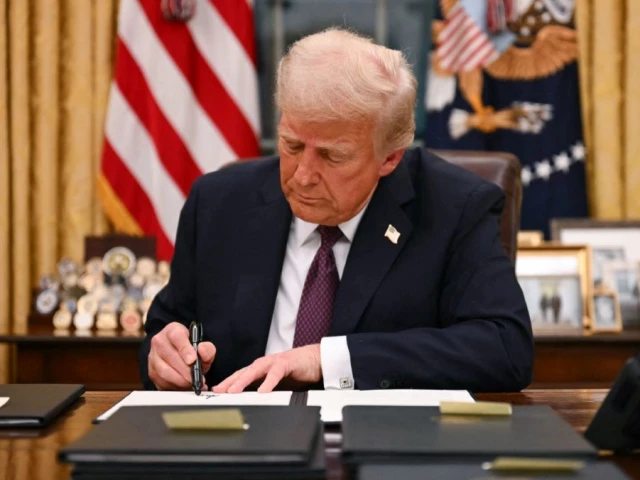US halts foreign aid funding, exempting Israel and Egypt
US Secretary of State Marco Rubio implements a three-month freeze on new obligations for foreign aid programmes.

The Trump administration has halted nearly all new foreign assistance funding, sparing only military aid to Israel and Egypt, along with emergency food programmes, according to an executive order issued this week.
The move has sparked global criticism amid fears of dire consequences for humanitarian and health initiatives.
The announcement, made by Secretary of State Marco Rubio on Friday, implements a three-month freeze on new obligations for foreign aid programmes.
Rubio directed senior officials to "ensure that, to the maximum extent permitted by law, no new obligations shall be made for foreign assistance."
Among the initiatives affected is the President’s Emergency Plan for AIDS Relief (PEPFAR), a global health programme credited with saving 25 million lives since its inception in 2003 under the George W. Bush administration.
The programme, which provides life-saving treatment for HIV/AIDS patients, faces uncertainty as its funding is set to expire in March 2025.
“This is lunacy. It will kill people,” said Jeremy Konyndyk, a former official with the US Agency for International Development (USAID). He added, “If implemented as written, a lot of people will die.”
Other critical health programmes, including vaccination campaigns and emergency medical clinics, are also affected by the freeze, raising concerns about the immediate and long-term impact on vulnerable communities worldwide.
While most programmes are frozen, military financing for Israel and Egypt remains untouched. Both nations are among the largest recipients of US military assistance, receiving billions of dollars annually. A memo from Rubio highlighted exceptions for “foreign military financing for Israel and Egypt and administrative expenses, including salaries, necessary to administer foreign military financing.”
The decision has drawn backlash from critics who argue that US aid should be leveraged to demand human rights reforms from recipient nations. Calls to reconsider military assistance to Egypt and Israel have been growing due to their controversial records on human rights and governance.
The US is the world’s largest donor of foreign assistance, spending over $60 billion in 2023, which accounts for about 1% of the federal budget. The funding supports a range of programmes, including health, education, job training, anti-corruption efforts, and security initiatives.
The freeze has already led to work-stop orders for numerous aid projects around the globe, with humanitarian organisations warning of significant destabilisation in crisis-hit regions. Abby Maxman, head of Oxfam America, criticised the decision, saying, “The Trump administration is abandoning the United States’ long-held bipartisan approach to foreign assistance which supports people based on need, regardless of politics.”
Notably, the freeze does not include similar exemptions for Ukraine, which heavily relies on US military assistance to counter the Russian invasion launched in February 2022. The omission has raised questions about the administration's geopolitical priorities.
The freeze is expected to last at least three months, during which Rubio will evaluate existing programmes to decide whether to “continue, modify, or terminate” them. Experts warn that even temporary disruptions could have catastrophic effects on fragile communities dependent on US assistance.
Humanitarian groups have expressed fears that the freeze will exacerbate crises in regions already facing food insecurity, health emergencies, and economic instability. Critics argue that the decision reflects a retreat from US leadership in addressing global challenges.
“This order undermines America’s standing as a leader in humanitarian aid and development,” said a senior analyst at the Center for Global Development.
With the freeze in place, the fate of millions relying on US-funded programmes remains uncertain, and the international community continues to await clarity on the Trump administration’s long-term plans for foreign aid.



















COMMENTS
Comments are moderated and generally will be posted if they are on-topic and not abusive.
For more information, please see our Comments FAQ